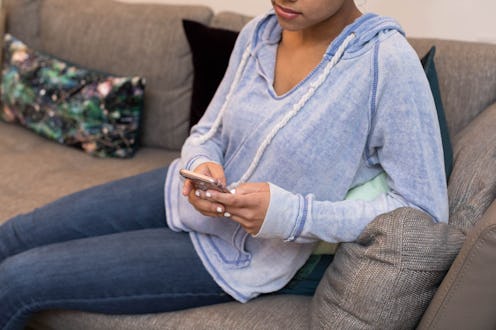Life
“Passively” Using Facebook Is Bad For Your Mental Health, Says The Social Network

Everyone participates on social media differently: Some of us post selfies every day, while others change their profile picture on an an annual basis. Many people broadcast personal information in their posts, but others keep their Facebook pages extremely private, or dedicated to sharing articles alone. Some scientists believe those differences in usage habits may directly influence your emotional well being. On Dec. 15, the social network itself put out a press release noting that Facebook affects your mental health differently depending on how you use it, and noted different scientific studies to back it up.
The findings were authored by David Ginsberg, the Director of Research at Facebook, and Moira Burke, who also works at Facebook as a social psychologist and Research Scientist. In the press release published on Facebook Newsroom, the scientists reported that “when people spend a lot of time passively consuming information — reading but not interacting with people — they report feeling worse afterward.” Meaning, if you tend to peruse social media without posting, commenting, or speaking directly with friends or followers, you may be unintentionally harming your mental health.
The researchers at Facebook referenced several different studies before reaching the conclusion that passive Facebook use is bad for you: A 2015 study conducted with students at the University of Michigan discovered those who used Facebook “passively” showed a steady decline in emotional satisfaction, and were more envious of others online. Furthermore, a 2017 study published in the American Journal of Epidemiology examined that simply “liking” clicks happiness, versus being communicative, actually hurt your mental health. The study’s authors declared, “Our results showed that overall, the use of Facebook was negatively associated with well being.”
However, there is an upside to using the popular social network — especially if you are actively engaging with others on the site. Collaborative research by the Facebook researchers and Dr. Robert E. Kraut, a professor at Carnegie Mellon University, revealed that those who engaged in individualized responses — such as commenting, direct messaging, and posting on a friend’s wall — reported feeling happier. Specifically, Ginsberg and Burke wrote interacting on the social network showed “improvements in social support, depression and loneliness.” The researchers stressed that one-on-one communication, especially with close friends, had the most positive effect on the emotional well being of Facebook users.
Facebook seems to be more cognizant of the fact that the social network affects mental health, and in recent months, has developed ways to support users who may be struggling with mental health issues. Just yesterday, Facebook announced the new “Snooze” feature that allows you to essentially mute friends for 30 days. Snooze is an easy way to not only block annoying ads, but to rid your social media circle of anything (or anyone) who may be making you stressed, angry, or upset. Additionally, Facebook reported on Nov. 27 that the company would roll out new AI technology that is designed to identify Facebook comments that indicate the original poster is at risk for suicide. Once concerning language is detected, the AI will notify trained moderators who will intervene by messaging suicide prevention resources, or by calling trained responders. Despite the fact that this tool seems well-intentioned, many people have concerns over the new technology; some have expressed it is an invasion of privacy, and that it oversimplifies the complicated process of suicide intervention.
In the age of modern technology, there is no denying that social media sites like Facebook are ingrained in our day-to-day routines. And, therefore, they can directly affect our mental, physical, and overall well-being. Just like you would adjust your sleep schedule or diet to make sure it's supporting your mental health, your Facebook usage should come second to your mental health needs. Balancing your time on the social network — and being aware of way you use it — is part of keep your mental health on the up-and-up. Next time you find yourself scrolling through your feed, or quietly stewing over other people’s posts, it may be time to put your phone down.